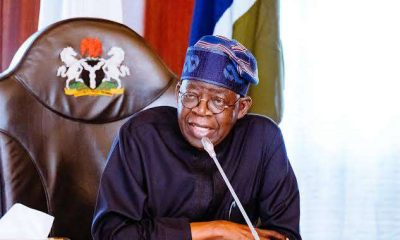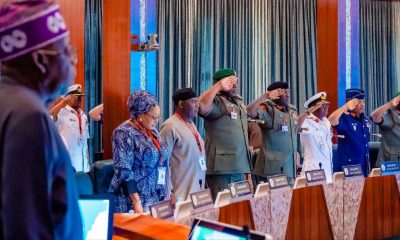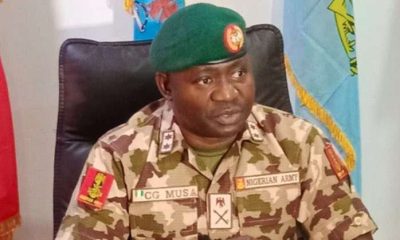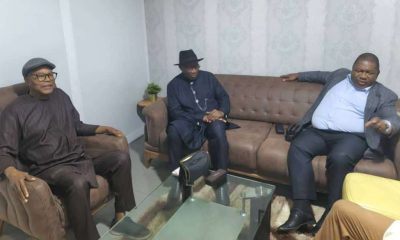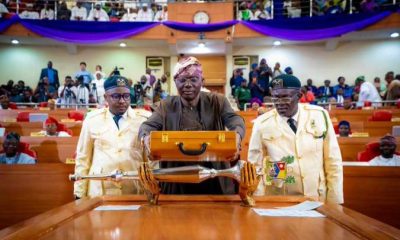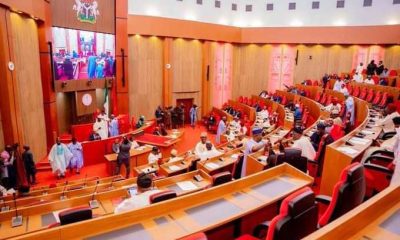Headlines
Chaos! APC lawmakers revolt against zoning
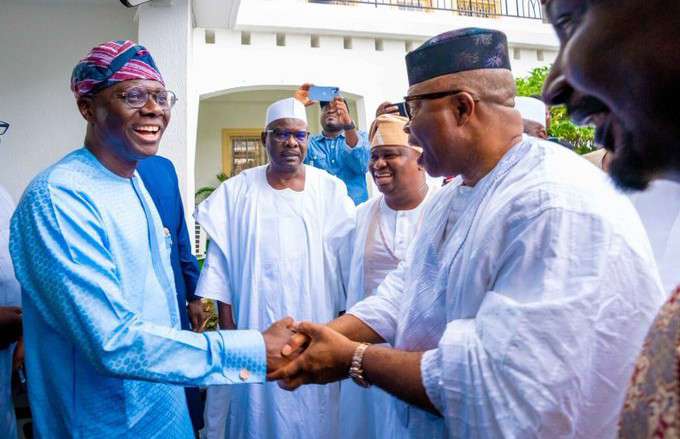
By OBINNA EZUGWU
When on Sunday, a group of All Progressives Congress (APC) senators and senators-elect, under the umbrella of Stability Group, led by Senator Godswill Akpabio, met in Lagos with Babajide Sanwo-Olu, governor of the state, it was with subdued optimism that the former Akwa Ibom State governor read out his credentials to restate his eligibility for the post of senate president.
During the meeting he declared that 86 senators would back his bid, but only a handful were with him on the occasion. A few days ago, he had been more optimistic. Proceeding his speech, when he was first officially anointed for the role by the party’s leadership in Abuja a fortnight ago, with Insha Allah, Akpabio had declared that his choice was God’s plan for the country. However, with spirited opposition mounted by his colleagues, the immediate past Minister of Niger Delta Affairs must have realized that becoming senate president won’t come easy.
The decision of the ruling APC to zone principal offices of the 10th national assembly, down to him and other individuals, has prompted a revolt in the ruling party, presenting Bola Tinubu, the country’s president-elect, with the first headache of managing a diverse nation with contending interests.
In Lagos, where Tinubu, the declared winner of February 25 presidential election holds sway, political offices are shared at his behest. And so dominant is his grip on the state’s politics that nobody ever successfully challenged his authority. But if he had any illusions about replicating his control of Lagos in the broader Nigerian political context, the chaos that has emanated from his party’s zoning of principal officers of the national assembly must have cleared such illusions.
Tinubu’s declaration as president-elect has predictably proved problematic. Both Atiku Abubakar, candidate of the People’s Democratic Party (PDP), who came second, and Mr. Peter Obi, candidate of the Labour Party, who came third in the results declared by the Independent National Electoral Commission (INEC), have gone to court to challenge the outcome. And their challenge has been about alleged irregularities in the electoral process, as much as it has been about the president-elect’s alleged drug dealing past.
Arguably the most unpopular politician to win presidential election in the country, his total vote haul of 8.79m, representing 36 percent of valid votes, is the least scored by any winner of presidential election since the return of democracy in 1999. His total is dwarfed by those of Atiku and Obi, who had 6.98m and 6.1m votes, respectively, or a combined 54 percent of total valid votes.
The duo of Atiku and Obi had run a joint ticket in 2019, and had been members of the PDP until the latter defected to the Labour Party last year, and there has been arguments about how Tinubu could have been unable to emerge winner if they had remained together. Tinubu has also had to contend with verbal abuse by young Nigerians on social media, who as he admitted during his recent visit to Port Harcourt, Rivers State, “call me on manners of things there.”
However, it takes simple majority, with the necessary spread to win presidential election in the country, and the former Lagos governor met the criteria, according to the results announced by the electoral umpire. He has told the court that he won; fair and square, and asked that the petitions filed by both Atiku and Obi be dismissed. The challengers have argued otherwise, in what is shaping up to be intriguing legal fireworks.
In the immediate, however, Tinubu would be more preoccupied with putting his anticipated administration in shape, ahead of his May 29 official inauguration as president. But if anything, he would have realised, from the enveloping crisis in his party over who becomes senate president and speaker of the house of representatives, that ruling Nigeria will not be a walk in the park.
It had first emerged as a rumour that Akpabio, had been chosen by Tinubu as his preferred choice for senate president. The rumour was eventually confirmed by David Umahi, governor of Ebonyi State and senator-elect for Ebonyi South, who disclosed on Friday, May 5, that he had met Tinubu earlier on Thursday and he (Tinubu) pleaded with him to step down for Akpabio; a request he said he obliged.
Umahi’s disclosure did not go down well with his Southeast colleagues, who soon after met at the Abuja home of senator Ifeanyi Uba, and maintained, in a communique, that the zone deserved the slot, and that they were backing Orji Uzor Kalu.
Umahi himself, had days after backing the Akwa Ibom politician, noted that the zoning arrangement needed to be reviewed.
On Monday, May 8, the ruling party officially announced, at a press conference addressed by Felix Morka, its national publicity secretary, that Akpabio had been adopted as consensus candidate for senate president.
Morka said the party also adopted the Chairman of the Senate Committee on Appropriation, Senator Jibrin Barau, as the next deputy senate president, meaning that while the senate president would go to the South South, the deputy will go to the Northwest.
Similarly, in the house of representatives, the seat of speaker was zoned to the northwest, with Kaduna lawmaker, Tajudeen Abbas, chosen, while Ben Kalu, a reps-elect from South-East, clinched the Deputy Speaker slot.
His announcement has since set off a firestorm. Lawmakers and lawmakers-elect from the Southeast, and across the north, notably the north central and the north west, have been up in arms, insisting on either senate presidency or house speaker, or indeed a complete control of the the legislature, as compensation for ceding executive power.
For the north central, which has Ahmed Idris Wase, the current deputy speaker from Plateau State, as the leading contender for the house leadership, it’s a case of being completely neglected. The zone was left with nothing in the ruling party’s arrangement, even after delivering four states to the party in the presidential election, to the Northwest’s one state. For the Northwest, however, the argument is that they delivered most votes to the APC as a zone.
Wase appears to have more broad-based northern support, and is evidently more popular than Abbas, who was chosen by the party, in what some are already alleging is a decision influenced by Femi Gbajabiamila, the incumbent speaker, based on ethnic considerations. Though Abbas his from Kaduna, few people have made a case about his first name, Tajudeen, a Yoruba name, and the idea that his mother is Yoruba.
“The APC is belittling the north central,” declared Yusuf Gadgi, a lawmaker on the party’s platform from Plateau State. “Most of us are rejecting the so called zoning, and if the party insists, be assured that the 2015 scenario will play out again.
“You cannot zone two principal offices, the speaker of the House and deputy senate president to one geopolitical zone, the northwest, and neglect the north central, which delivered four states, while the Northwest delivered only one.”
2015 scenario to play out?
In 2015, the APC backed Ahmad Lawan, the current senate president for the role, against the wish of the majority of the lawmakers. Eventually, a few APC lawmakers joined forces with their colleagues in the PDP and elected Bukola Saraki, former Kwara State governor, as senate president, and Ike Ekweremadu, a PDP senator, as the deputy senate president; an outcome that rattled the APC leadership.
Amid the zoning controversy, many have begun to suggest that the scenario will likely play out in both the senate and the House of Representatives. In the senate, the APC has a slight majority, with 59 of the 109 senators, while in the opposition parties, comprising of the PDP, Labour Party, NNPP, among others, have combined 183 of the 360 total, to APC’s 177.
Speaking in an interview with on Channels TV last week, spokesperson for the PDP and Minority Caucus in the 10th House of Representatives, Dachung Bagos, argued that the 360 members would elect their own principal officers, and that the APC’s zoning arrangement won’t be binding on them.
“I’m from the opposition, which is the greater majority. I usually don’t understand how some people do their political calculations. When you have a House, where the minority parties are 183 against your own party, which is 177, you sit down in a room, take tea and just allocate positions,” he said.
“We have the majority; they don’t have the majority. They have the majority as an individual party but we have the majority as minority parties. That’s why we call ourselves the greater majority.”
Coalitions against APC
Though with their individual ambitions, lawmakers, who lost out in the APC arrangement are rallying. Last week, rebel house members and members-elect held consultations with their colleagues in the opposition, and appear to be favouring Hon. Muktar Betara Aliyu, who is from Borno State in the Northeast, same state as Kashim Shettima, the vice president-elect.
“We have listened to the contestants. We called all the contestants to a meeting, and after listening to them, we decided that Betara is the best for the job,” said Peter Apanke, a PDP house member from Cross River State.
“We have decided that, irrespective of political party, it is the person that we want to support. APC should stop trying to impose a candidate on us. We’re going to elect the leadership we want; the leadership that will help us to deliver constituency projects to our people.”
Also speaking on Arise TV last week, a former member of House from Niger State, Hon. Abubakar Chika Adamu, insisted that present and former members of the House held consultations and settled for Betara, while accusing the Southwest of pushing a regional agenda with the choice of Abbas.
“It appears that the Southwest are already promoting regional agenda,” said the former house member, who is an associate of Betara.
“We have friends from the Southwest in our group, but when we met, none of them showed up. What we’re seeing is a regional agenda to divide the north, but it will not be allowed to fly. Abbas is not popular. Everyone knows that Betara is more popular, even the speaker used to call him head boy.”
On Friday, Betara, a fourth termer, who chairs the House Committee on Appropriation, boasted that the coalition of house members, who are against the position of the APC will determine who becomes speaker.
Betara, who spoke during the unveiling ceremony of the speakership bid by a member of the coalition, Wase, expressed optimism that their group would arrive at a consensus on who is best suited to preside over the proceedings of the House.
Reiterating his opposition to the move to impose a Speaker on the House of Representatives, he noted: “For us, we formed this group because we are opposed to the zoning arrangement of the party. We are not fighting and we would not fight. We are in support of a consensus candidate.
“We can pick the candidate from among ourselves if we all sit down and decide on it. I assure all of you it is only one person that God would choose to be Speaker. I assure you we are not going to have any issue. We are going to agree to support one of us as the Speaker.”
Meanwhile, in the senate, both Abdulaziz Yari, former Zamfara State governor, who is insisting on becoming senate president, and Orji Kalu, alongside their allies, met on Thursday and presented a protest letter to Abdullahi Adamu, APC national chairman.
Speaking at the meeting in Abuja, Yari said they were not satisfied with the zoning arrangement.
“We are here to present our letter of grievances to you and also tell this honourable house that as leaders, we are not satisfied with the arrangement,” he said after presenting a protest letter.
“What we are expecting from you people is to give us fair play, at least if nothing, to mention that a particular position is zoned and anybody in that zone can participate.”
Equally speaking on the occasion, Kalu maintained that it was only proper for the southeast to produce the senate president, noting that he won’t abide by the zoning arrangement of the ruling party.
“If the APC decides to move forward with this idea, I’m going to say no,” he said. ‘I believe in the party and I love the party. I brought three of my coworkers with me because I’ve never broken this party’s rules.
“However, you folks will see me this time. This will be the first time we refuse to do what the party requests. We won’t comply with anything you say on the Senate floor.
On his part, Adamu, who admitted that the APC did not make adequate consultations before settling for Akpabio and others, said the party’s leadership would go through their letter to address their grievances.
“Hold the fire until the last word is heard from us, we are the custodians of the party as NWC, but we are not acting alone. The voice of Tinubu, the President-elect is an essential voice,” Adamu said.
“We must accommodate him the best we can. I will not compromise on that. He is right now outside the country and by the grace of God when he comes back we will go back to the drawing board and put our heads together again and see what we will get.
“I cannot preempt that, I will wait until we hold that meeting with the president-elect.”
North insist on control
Amid the controversy over the ruling party’s zoning arrangements, a number of northern leaders on Friday, met at the Arewa House, Kaduna State, on the occasion of a one day round table on Nation Building and Democracy with the theme, “The imperative of participation, equity and equitable development of Northern Nigeria,” powered by the Democratic Research Institute (DRI), and resolved that the party must cede control of the national assembly and other key ministerial appointments to the region.
In the communique signed by Prof.Tukur Muhammad-Baba, Chairman of the Communique Committee and Dr. Benjamin Izra Dikki, Secretary, the leaders maintained that because the North was not in control of both the Executive and the Judiciary arms of government, their demand was non-negotiable.
“In a table that was contained in the communique that showed the percentage of votes across the six geo- political zones, the Northwest zone gave a total vote of 2,652235, the North Central 1,742,993, while the North East gave 1,185,458. The total contributions of the North was 63.5%.”
The communique explained that the South-west gave 25.7%, the South-south 9.10 while the South-east delivered 1.45% of the votes for the ruling APC.
It continued, “Based on the contributions of the North in the just concluded general elections, as evidenced in the table above, the round table, which drew participants from all the nineteen Northern states, concluded that the progress, transformation and development of the region are hinged on its stake in government, particularly access to political, economic incentives and opportunities and, therefore, resolves as follows:
“Demand the leadership of the National Assembly in consonance with the provisions of section 14 and sub-sections (1), (2) and (3) of the 1999 Constitution, as amended. This is necessary because the North is not in control of both the Executive and the Judiciary arms of government. This demand is non negotiable.”
“The North also demands fair share of ministerial and other appointments. Such appointments should take cognisance of competence, integrity and track record, otherwise, the region is left with no option than to de-invest its support for the government and the party in subsequent elections.”
Shettima advocates for Christian senate president.
Meanwhile, amid the spirited agitations by the north for the leadership of the national assembly, Kashim Shettima, vice-president-elect, has implored lawmakers-elect to accept the zoning arrangement of the party.
Shettima, who spoke during a meeting with some of the house of representatives members-elect on Friday, said APC seeks to avoid a situation, where all the top officials of the incoming administration would be of the same faith.
He said the circumstance could “validate the negative narrative of the Islamisation agenda of Nigeria”.
The former Borno State governor added that the leadership of the forthcoming national assembly must be inclusive because the “stability of the nation is much more important than any other consideration”.
“What we are trying to avoid is a situation whereby the number one citizen, number two citizen, the number three citizen, and the number four citizen are all of the same faith. That will lend credence, and validate the negative narrative of the Islamisation agenda of Nigeria,” the vice-president-elect said.
“This is why my principal, a fair-minded leader, Asiwaju Bola Ahmed Tinubu, is more inclined towards having the number three citizen from the South/south or the south-east. Even in the current circumstance that we find ourselves in, the stability of the nation is much more important than any other consideration.”


